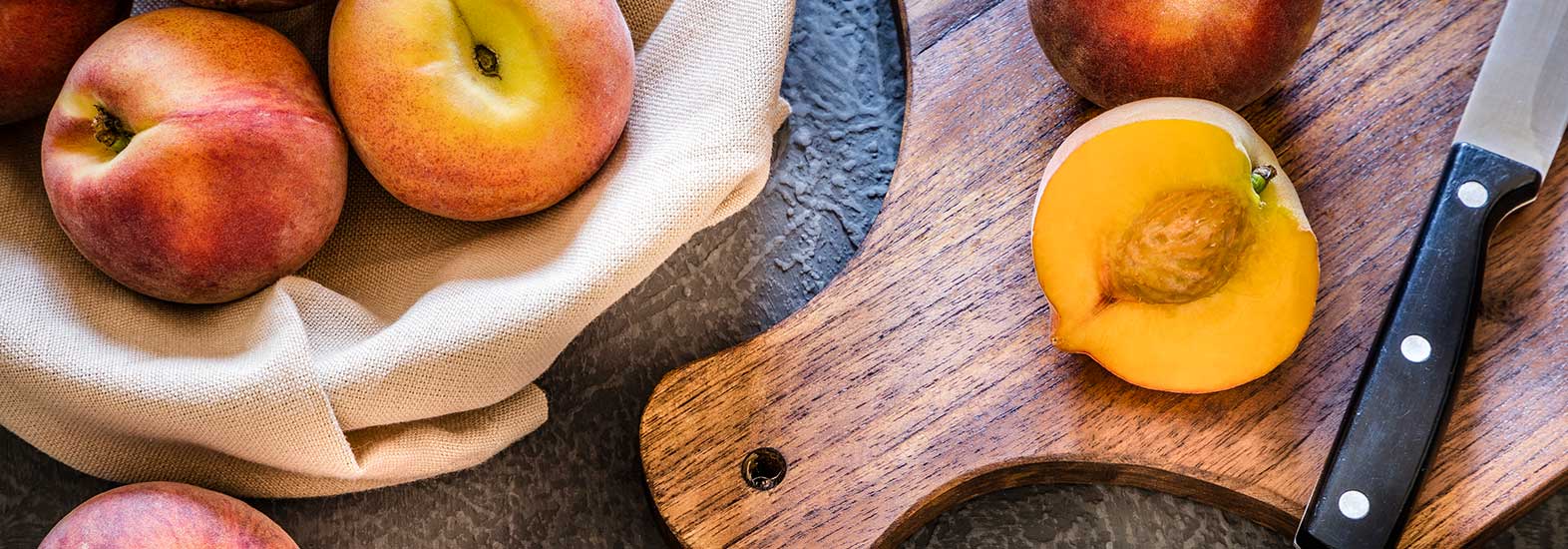In New Jersey, the peak season for peaches occurs July 20th through September 1st. So, August is the perfect time to head out to your local farmer’s market and purchase some of these delicious and nutritious summer fruits. Or better yet, find a local farm where you can pick your own peaches and enjoy a day out in the sunshine with friends and family. You can’t get any fresher than right from the tree!
Nutritional Breakdown
Peaches are low in calories and have no saturated fat or cholesterol, but contain antioxidants, vitamins, minerals, and fiber. They are also quite hydrating since they are 85% water. One medium peach (150 grams) provides 58 calories, 14g of carbohydrates, 2g of fiber, 13g of sugar, and 1g of protein. It also contains 6% of your daily value of vitamin A and 15% of your daily value of vitamin C. And if that wasn’t impressive enough, this summer fruit also packs in 2% or more of your daily intake of vitamins E and K, niacin, folate, iron, choline, potassium, magnesium, phosphorus, manganese, zinc, and copper.
Health Benefits
Peaches provide a significant amount of vitamin C. This vitamin is a powerful antioxidant that helps prevent the formation of free radicals, which are compounds linked to cancer development, heart disease, and arthritis. It’s also involved in many body functions, including the formation of collagen, absorption of iron, the immune system, wound healing, and the maintenance of cartilage, bones, and teeth.
These yummy summer fruits also contain vitamin A, or more specifically, beta-carotene which is a precursor of vitamin A. When you eat the fruit, your body converts the beta-carotene to vitamin A. Vitamin A is crucial for healthy vision and like vitamin C, plays a role in keeping the immune system healthy and can help reduce the risk of certain cancers.
Fiber is also very important to our health, but the average American only gets about 15g per day. That’s about half of the recommended 25-30g of fiber. Peaches can help you to get additional healthy fiber into your diet. Fiber not only helps to reduce the risk of developing various conditions, including heart disease, diverticular disease, constipation, and colon cancer, but it is important for the overall health of the digestive system and for lowering cholesterol. Fiber slows the speed at which food passes from the stomach to the rest of the digestive system, which can make us feel full longer and help support healthy weight management. Foods that are higher in dietary fiber often are lower in calories as well! And because fiber slows down how quickly food is broken down, it may help control blood sugar levels for people with diabetes by reducing blood sugar levels after meals.
Diet Tips
There are so many ways you can incorporate peaches into your diet and reap the health benefits of this summer beauty!
- Try adding one diced medium peach into a blender with your choice of milk and a scoop of vanilla protein powder to make a peach and cream smoothie treat.
- Slice fresh peaches over lettuce greens with grilled shrimp or grilled chicken (or protein of choice) to make a healthy, quick summer lunch.
- Eat as an easy, on-the-go snack. No prep required!
- Add peaches to a breakfast dish. Try them in your morning oatmeal or use it as a substitute for maple syrup over whole wheat pancakes.
The possibilities are endless!

